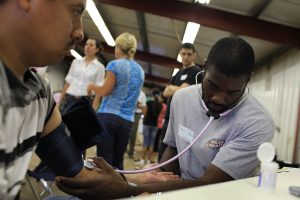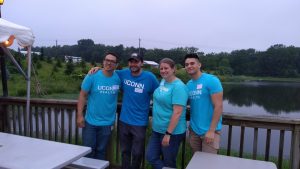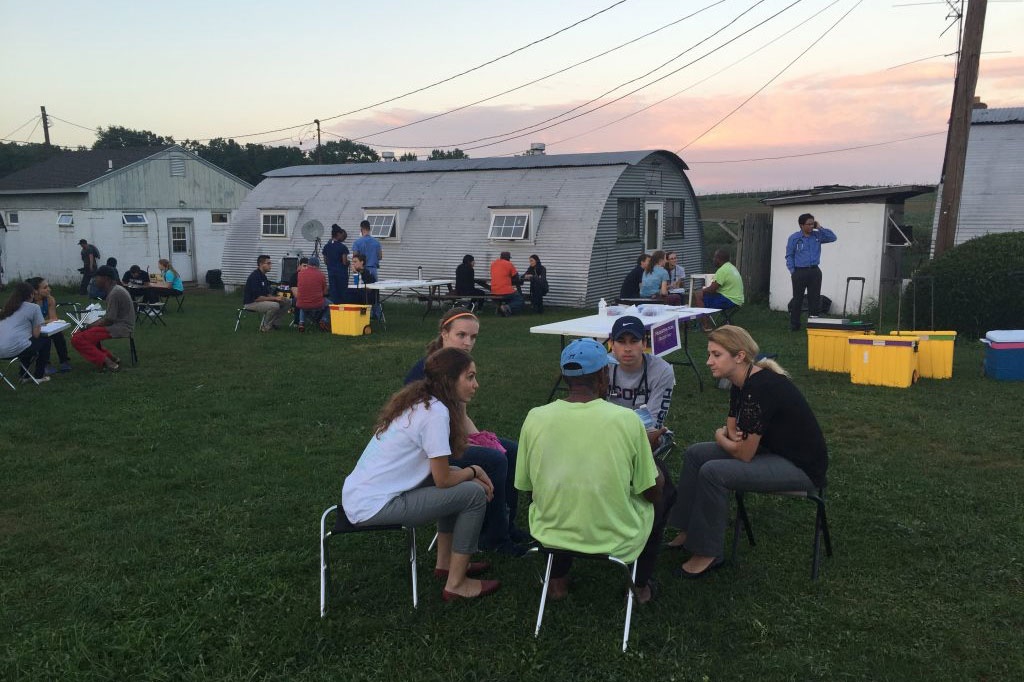Where there’s a will, there’s definitely a way.
It’s been more than two decades since two young medical students at UConn School of Medicine first approached their faculty mentor Dr. Bruce Gould wanting to find a way to help the underserved.
It was perfect timing.
The Connecticut Council on Occupational Safety and Health (ConnectiCOSH) was beginning to spearhead outreach to local farms to improve the health of migrant farm workers. This outreach ultimately led to the Massachusetts League of Community Health Centers receiving a federal voucher grant and the creation of the CT River Valley Farmworker Health Program (CRVFHP) to address the health care needs of the migrant farm worker population from Connecticut’s Long Island Sound to the Vermont border.

Today the medical student-run UConn Migrant Farm Worker Clinic, part of a larger inter-agency and organizational effort, has been going strong, with activities expanding across 17 farming communities in Connecticut offering free health care and screenings three nights a week from June to Oct. during the growing season on the farms and nurseries where the migrants work and often live. The clinic fully partners with FQHCs for referral and follow up.
“Twenty-three years ago our medical students saw an unmet need in the underserved community, and UConn helped marshal the resources to make the clinic happen. Now our migrant farm worker clinic has become part of the fabric of Connecticut and UConn,” shared Gould, founder and faculty advisor to the UConn Migrant Farmer Clinic based in UConn medical school’s Connecticut Area Health Education Center (AHEC). “The clinic has evolved to be a robust, efficient system of care for the migrant farmers over the last two decades.”
Depending on the growing season’s weather conditions, it is estimated that the number of migrant farm workers in Connecticut could be up to 20,000. The majority of the migrant farmers cared for by the clinic, are transient, have no or limited English proficiency, lack health insurance and are low-income without the funds to access medical care, nor the time with their arduous work schedule to see a physician for care. They may be at high risk for occupational hazards associated with farming such as skin issues and repetitive motion and orthopedic injuries, and common chronic illnesses such as diabetes and hypertension.
“These migrant farm workers don’t get paid if they don’t work,” stresses Gould. “So we take the clinic directly to them at the farm and nurseries around the state where they are working and living. We provide critical access to health care and we screen, diagnose, and triage their medical issues in real-time, onsite at the farms. Also, a mobile pharmacy run by the faculty and students of the UConn School of Pharmacy is onsite during the clinic visits.”

“We don’t typically think of Connecticut as a farm state, so this is a population that doesn’t get recognition for the work they do and that people in Connecticut may forget about,” says second-year medical student Christian Caceres, 23, of Madison who is one of the clinic’s medical student coordinators. His fellow medical student coordinator leads are second-year medical students Will Bogaert and Elizabeth Sheils, along with part-time lead Brett Chen.
Caceres adds: “These migrant farm workers leave their home country to work in Connecticut during the growing season to send money home to their families. They are busy working from sunrise to sunset when most doctors’ offices are only open. So we are the future doctors volunteering to give them free access to primary care and simple health screenings for conditions that if untreated could become life-threatening.”
The clinic’s fleet of health care providers are solely volunteers. But it is not just UConn medical students involved. Other student volunteers hail from UConn School of Dental Medicine, UConn School of Pharmacy, as well as the UConn physical therapy doctoral program. Also, the physician assistant students of Quinnipiac University and St. Joseph’s also give back, along with other students from health professional degree programs, including incoming medical and dental students at UConn, graduate schools, colleges, high schools, or students interested in applying to health profession schools.
Also, more than 50 doctors volunteer their time and expertise including 35 UConn Health doctors and dentists. Plus, medical residents in training, social workers, nurses, nurse practitioners, pharmacists, physician assistants, and physical therapists, and community health workers.
“We have more volunteers than we have volunteer slots,” says Gould. All volunteers receive in-depth clinical, cultural competency, and population health risk assessment skills training in advance of their clinic participation.

During last year’s growing season, at the clinic’s 28 separate farm visits, nearly 500 volunteers cared for more than 327 migrant farmer patients (with a total of 428 patient care visits) at 17 different farm locations. In addition, 51 patients received dental care. In 2018, the 412 student volunteers committed over 4,000 hours of community service and outreach for the migrant farmers.
Also, 187 patient referrals were made to local community health centers and FQHCs for the migrant farmers important follow up care needs through the CT River Valley Farmworker Health Program (CRVFHP). The medical student clinic coordinators, who encourage and organize the patient referrals onsite at the farms, conduct weekly follow up communications with the local community health centers to ensure a patient’s access to follow up care is confirmed. The migrant farmers’ follow up care is funded by a federal voucher grant from the Bureau of Primary Health Care to CRVFHP.
“It is a big team effort. It’s been such a wonderful experience volunteering at the farms to help these underserved people who are so grateful for our care,” says Caceres. “It also has given me a great deal of leadership skills and patient care experience.”
Part of the student coordinator’s role is recruiting individuals to meet the need for medical interpreters.
“A lot of the migrant farmers we care for are from Mexico or Latin America and they don’t speak English. With the current political immigration debate and news coverage the migrant farm workers can at times be hesitant or afraid to register or participate in the free, confidential health clinic,” says Caceres. “But my Spanish speaking skills and the help of the volunteer medical interpreters has been vital with gaining trust of this community. We reassure the migrant workers that we simply are here to provide free health care and eventually pleased migrant farmers spread the word to others that UConn is indeed a trusted source of care.”
One of the clinic’s volunteer physicians is Dr. Julian Nieves who recently joined UConn Health as an assistant professor of medicine and part of CT AHEC led by Gould. He is a Connecticut native of Meriden, who trained at nearby Yale, and completed his fellowship in minority health policy.
“At the student-run clinic we all come together to volunteer and care for the migrant seasonal farm workers,” says Nieves. “It is a great service to be part of filling a gap in the community’s health needs without the issue of health insurance coverage being a factor.”
According to Gould this program is not only having a lasting impact on the health of each of the migrant farmers and their families, but also a powerful impact on the students who participate. The student volunteers get strong lessons for how to care for at risk populations, the underserved, and how to organize and coordinate patient care.
“My biggest hope is that by caring for this unique population of patients, students will better understand cultural competence, population health risk, and know what they are supposed to do as physicians,” says Gould. “I hope it nudges them to continue to give back to the community and be of service to others always throughout their career.”
Gould noted, “Many of our volunteer clinicians are a bit toasty around the edges questioning the sustainability of our health care system. But one night out at the camps caring for the migrant farm workers reminds them why they went to medical school in the first place – to care for others.”
Caceres part of the future generation of doctors couldn’t agree more.
“The migrant farmer clinic is awesome. It symbolizes the whole reason I wanted to get into medicine in the first place,” says Caceres. “I love being able to care for patients who need it most. I hope the migrant farmers continue to get the primary care and follow up medical care they deserve.”
The idea of UConn’s migrant farm worker health care program has spread to other states and translated into programs in Vermont, Massachusetts, and Syracuse, New York.



